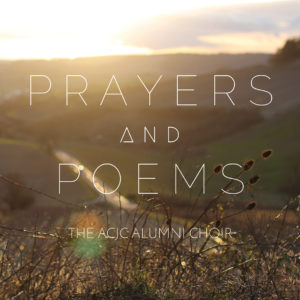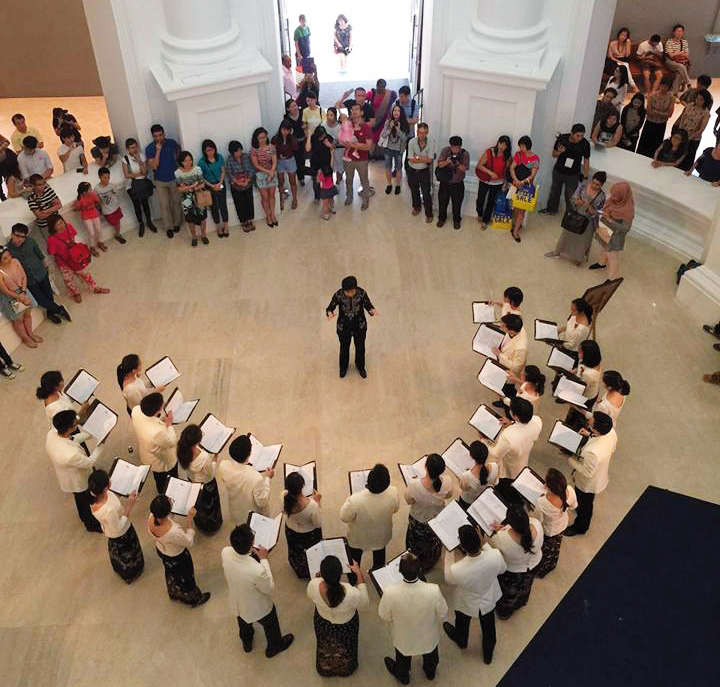Rezensiert von Tobin Sparfeld, Chorleiter und Pädagoge
 Der 1977 ins Leben gerufene Anglo-Chinese Junior Choir hat in seinen Anfangsjahren eine eindrucksvolle Entwicklung durchlaufen und wunderschöne Chormusik hervorgebracht. Man möchte daher annehmen, dass ein Alumni-Chor, der sich aus ehemaligen, weiterhin aktiven Sängern und Sängerinnen zusammensetzt, gleichermaßen beeindruckt. Diese Vermutung bestätigt sich, wenn man dessen jüngster Aufnahme, Prayers and Poems, lauscht.
Der 1977 ins Leben gerufene Anglo-Chinese Junior Choir hat in seinen Anfangsjahren eine eindrucksvolle Entwicklung durchlaufen und wunderschöne Chormusik hervorgebracht. Man möchte daher annehmen, dass ein Alumni-Chor, der sich aus ehemaligen, weiterhin aktiven Sängern und Sängerinnen zusammensetzt, gleichermaßen beeindruckt. Diese Vermutung bestätigt sich, wenn man dessen jüngster Aufnahme, Prayers and Poems, lauscht.
Das Anglo-Chinese Junior College ist ein zweijähriges methodistisches College, das 1977 in Singapur gegründet wurde. Für die Schule, die knapp 2000 Schüler und Schülerinnen zählt, hat der College-Chor als Preisträger internationaler Wettbewerbe in Schweden, Finnland, den Niederlanden, der Tschechischen Republik und der Slowakischen Republik eine wichtige Botschafterfunktion inne. Der Alumni-Chor umfasst 37 Sänger und Sängerinnen, die auch nach ihrem Ausscheiden aus dem College-Chor weiterhin anspruchsvolle Chormusik betreiben. Valarie Wilson, eine ehemalige Schülerin des Anglo-Chinese Junior College und Absolventin des King’s College London, leitet des Ensemble.
Neben seinen jährlichen Konzerten, Wettbewerben und Gastspielreisen widmet sich der Alumni -Chor auch der Vermittlung und Aufführung neuer Musik, und zwar sowohl von singapurischen als auch von ausländischen Komponisten. Dieses neue Album bringt Werke zweier zeitgenössischer Komponisten zu Gehör, nämlich Eran Dinur und Kelly Tang. Eran Dinur ist ein in New York lebender israelischer Komponist und Visual-Effects-Künstler. Er hat Musik für verschiedene Instrumental- und Vokalensembles komponiert, darunter auch zahlreiche Musikwerke für das Theater. Kelly Tang ist ein Komponist aus Singapur, dessen Orchesterwerke von dem Symphonieorchester Singapurs, dem „Singapore Symphony Orchestra“, regelmäßig aufgeführt werden. Bekannt ist Tang vor allem wegen seiner Blasorchester- und Instrumentalwerke, doch hat er auch Musik für mehrere Chöre Singapurs komponiert. Alle Werke in dem Album sind Kompositionen der letzten zehn Jahre.
Das Album beginnt mit zwei Werken von Eran Dinur, bei denen es sich um Pijjutim handelt – jüdisch-liturgische Gedichte, die anlässlich verschiedener religiöser Anlässe gesungen oder vorgetragen werden. Adon Haselighot („Gott der Vergebung“) ist ein faszinierendes Werk, das sich mit der Bitte des Menschen um Gnade auseinandersetzt. Das Werk ist gekennzeichnet durch einen Refrain mit zugänglichen Harmonien und einer Melodie in Moll mit punktierten Rhythmen, die sich nach und nach zu einem kraftvollen Höhepunkt hin steigert. Kurze Solo-Ausrufe markieren diesen temperamentvollen Auftakt. Dem steht Adon Olam kontrastierend gegenüber, eine ruhige Vertonung mit anspruchsvollen, aber nicht besonders dissonanten Harmonien, die zahlreiche Ähnlichkeiten mit verschiedenen Chorsätzen von Samuel Barber aufweist.
Dem folgt Tres Ciudades („Drei Städte“), eine Suite, die auf Gedichten des spanischen Dichters Frederico Garcia Lorca basiert. Das erste Stück, Malagueña, setzt ein mit den Bässen, die in sehr tiefer Lage ominöse Gesänge anstimmen und sich dabei in Halbtonschritten bewegen. Darauf antworten die Tenöre mit einer sehr eindringlichen Melodie. Diese allmählich ansteigende Melodie wird vom Alt und später vom Sopran nachgeahmt. Nach einem fulminanten Aufblühen klingt das Werk mit verhauchender Spannung aus.
Das zweite Stück, Barrio de Córdoba, steht dem ersten mit seinem weichen und dunklen Charakter kontrastierend gegenüber. Hier wird der homophone Satz durch unerwartete, in neuen Akkorden mündende Abwärtsglissandi unterbrochen. Das dritte und letzte Stück, Baile, kombiniert eine fetzige Melodie mit den perkussiven Effekten einer begleitenden Flamenco-Gitarre. Die Intonation und die Solisten sind beeindruckend, doch entwickeln alle drei Stücke keine ausreichende Dramatik.
Das überzeugendste Werk von Kelly Tang ist Tread Softly, eine Vertonung des Gedichts von William Butler Yeats „He Wishes for the Cloths of Heaven“ („Hätt ich des Himmels reichbestickte Tücher …“). Es zeichnet sich durch eine Reihe von üppigen harmonischen Effekten aus und wird von dem Alumni-Chor wunderbar gesungen, insbesondere die Solo-Sopranstimmen.
Dem folgt Nei’la, ein Gebet, das während Yom Kippur vorgetragen wird. Das Werk beginnt mit einer eindringlichen Solostimme, deren Melodie von der Musik des Nahen und Mittleren Ostens inspiriert ist. Diese wird von den Männerstimmen beantwortet und verstärkt und mündet letztlich in einer heftigen Kakophonie aus abwärts gerichteten Gesängen und über ganze Oktaven fallenden Glissandi. Nach ihrem Abklingen gesellen sich die Oberstimmen hinzu, zunächst friedvoll, später jedoch als stimmgewaltiges Flehen um Gnade in Gesängen, die wie wütende Bienenschwärme klingen. Dies entwickelt sich in wiederholte, langsamere, beklommene Darstellungen des Jüngsten Gerichts.
Die letzten zwei Lieder stammen von Kelly Tangs. In The Snow Man findet ein Gedicht des amerikanischen Dichters Wallace Stevens seine musikalische Umsetzung. Der existentialistische Text wird durch Harmonien herausgestellt, die warm beginnen, sich jedoch langsam in gehauchte Dissonanzen auflösen, je näher sie sich dem Ende zu bewegen. Dem schließt sich eine Vertonung des Pater Noster auf Englisch an. Es handelt sich hierbei um ein Auftragswerk des ACJC-Chores zur Feier seiner 25-jährigen Mitwirkung in dem Choral Excellence Program. Wenngleich gut gesungen, so endet es abrupt und enthält nur wenige emotionale oder musikalische Höhepunkte.
Der Gesang des ACJC Alumni-Chors ist ein willkommenes Schmankerl für Chormusik-Begeisterte. Der Chor singt einfach fantastisch. Obwohl es sich bei allen Stücken um anspruchsvolle A-capella-Sätze handelt, zeigt sich kaum eine Intonationsschwäche. Die Stimmen singen mit hoher Gestaltungskraft und Leuchtkraft und konstant mit kräftigem, stimmlich wohlgestütztem Klang. Valarie Wilson sollte dafür gelobt werden, einen so angenehmen Klang erarbeitet und erzielt zu haben. Es lassen sich kaum Punkte für Verbesserungsvorschläge finden. In Malagueña könnten die Bässe vielleicht eine Spur heller klingen, und die Tenöre könnten an verschiedenen Stellen ihren Klang besser bündeln. In manchen Stücken ist hie und da der Text schwer verständlich. Doch diese Anregungen sind spitzfindig und pedantisch angesichts einer überaus gut produzierten Aufnahme.
Wenngleich der Chorklang durchgängig von hoher Qualität ist, ist das Format der Kompositionen wechselhaft. Einige Werke wie beispielsweise Malagueña, Ne’ila, Adon Haselichot und Tread Softly sind einzigartig und bezaubernd, während zahlreiche andere Stücke mit ihren typischen zeitgenössischen akkordischen Harmonien, betont durch leicht ätzende Dissonanzen, einfach vorbeirauschen.
Während sich der ACJC College Choir bereits sowohl in Singapur als auch auf internationaler Bühne einen Namen gemacht hat, arbeitet der Alumni-Chor noch daran, sich den guten Ruf als ein herausragendes Chorensemble zu erarbeiten. Prayers and Poems ist ein Album, mit dem sich Freunde der Chormusik vertraut machen sollten, da es sich um ein Beispiel von großem Chorklang, hoher Kunst und dem Bekenntnis zur Förderung von zeitgenössischen Komponisten und Chorwerken handelt. Bleibt zu hoffen, dass dieses Album nur der Anfang einer Folge zahlreicher ausgezeichneter Aufnahmen dieser faszinierenden Sänger und Sängerinnen ist.
Übersetzt aus dem Englischen von Petra Baum, Deutschland

